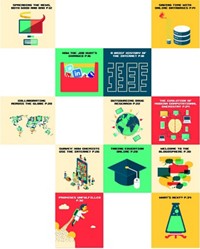Advertisement
Grab your lab coat. Let's get started
Welcome!
Welcome!
Create an account below to get 6 C&EN articles per month, receive newsletters and more - all free.
It seems this is your first time logging in online. Please enter the following information to continue.
As an ACS member you automatically get access to this site. All we need is few more details to create your reading experience.
Not you? Sign in with a different account.
Not you? Sign in with a different account.
ERROR 1
ERROR 1
ERROR 2
ERROR 2
ERROR 2
ERROR 2
ERROR 2
Password and Confirm password must match.
If you have an ACS member number, please enter it here so we can link this account to your membership. (optional)
ERROR 2
ACS values your privacy. By submitting your information, you are gaining access to C&EN and subscribing to our weekly newsletter. We use the information you provide to make your reading experience better, and we will never sell your data to third party members.
Policy
The Google Model
by Rudy Baum
November 5, 2007
| A version of this story appeared in
Volume 85, Issue 45
On the long flight home from Milan after CPhI, the conference on pharmaceutical ingredients, I was seated next to a young man who trades stocks professionally and sells a newsletter on investing to a select audience. Generally, I am not much of a talker on airplanes, but the young man, whose name was Jeff, and I chatted on and off during the nine-hour flight about a variety of topics, including the Internet and the news business today.
Jeff said that he had not read a newspaper in more than five years. "I get all my news from Google News," he declared. "I've got it set up so that everything I need to know about companies I'm investing in is delivered to me."
In the course of the conversation, I stated that Google and other search engines delivering news were essentially parasitic in that they do not bear any of the costs of generating the content they deliver to readers. Jeff took strong exception to that characterization, maintaining—as I am sure Google would maintain—that the search engine is simply delivering information that newspapers and other news-gathering entities make freely available.
Jeff was correct, of course. Newspapers have given up on trying to sell online access to their content, opting instead to try to maximize the number of "eyeballs" that view that content to drive advertising dollars. The Google business model is all about advertising.
Don't get me wrong, I am a big fan of advertising. Advertising revenue—display and classified, both in print and online—makes up a major component of C&EN's total budget.
However, my conversation with Jeff has stayed with me for the past few weeks and caused me to reflect on an axiom about the Internet that has annoyed me for years: "Information wants to be free." It's the rallying cry of many who argue that all content on the Internet should be open to all free of charge.
So I did a Yahoo search on "information wants to be free." The first hit returned was for Wikipedia, the free, collaborative online encyclopedia; according to it, the phrase was first pronounced by Stewart Brand at the first Hackers' Conference in 1984. Brand was quoted as saying: "On the one hand, information wants to be expensive, because it's so valuable. The right information in the right place just changes your life. On the other hand, information wants to be free, because the cost of getting it out is getting lower and lower all the time. So you have these two fighting against each other."
That's interesting for a couple of reasons. I knew of Brand, who was responsible for the Whole Earth Review and the "Whole Earth Catalog," as a visionary, but, Wow! 1984 was a long time ago. I was still using a Texas Instruments computer with 256 kB of memory. The Internet wasn't even a blip on my radar screen.
More important, though, is the far greater nuance of what Brand actually said compared with the simplistic notion that is now uttered. He recognized the tension between the value of information and the ease with which it can be disseminated.
What makes information valuable? Brand's notion has the user of the information defining value: "The right information in the right place just changes your life." But why does a user of information find it valuable? Because the individual or institution that created it and disseminated it took great care to somehow imbue it with value. I'm being vague here because the value a user finds can come in many flavors. Beauty. Utility. Insight. Inspiration.
I don't actually believe that information wants to be free. I don't think information gives a damn. I think cheapskates want information to be free.
Brand was onto something, but he was missing something, too. The Internet disseminates information very, very cheaply, but it doesn't create information. What the Internet disseminates varies wildly in quality. Those who create valuable information deserve to be compensated for it. I'm not sure the Google model can actually achieve that across the board, which is why I still think, at some level, it is inherently parasitic.
Thanks for reading.
Views expressed on this page are those of the author and not necessarily those of ACS.



Join the conversation
Contact the reporter
Submit a Letter to the Editor for publication
Engage with us on Twitter